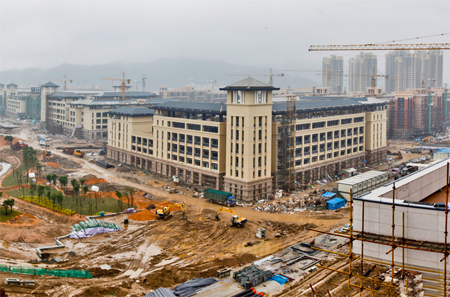Relocation to the new campus is expected
to start in the autumn of 2013. How are the preparations going?
Relocation
in Three Stages
According to the contractor, the new campus will be completed and delivered to the SAR government in late March or early April 2013, after which the SAR government will hand over the campus to UM as the user. UM will then arrange for some staff to move to the new campus first to carry out various work related to the relocation, which will be conducted in three stages.
From April to June 2013, the Pilot Move stage, some staff from the Rector’s Office, Campus Management Office (CMO), Campus Development Office, Information and Communication Technology Office (ICTO), Office of Health, Safety and Environmental Affairs (HSEO), Communications Office, and the new campus project task force, will move to the new campus to carry out post-delivery cleaning, quality inspection, testing, furnishing, equipment installation, etc. In addition to getting familiar with the various operation systems in the 80 individual buildings to be managed by the university, UM will also need to follow up on the contractor’s defect list, carry out decoration, install equipment and move in furniture. The great challenges will include relocating and fitting out the dry lab and wet lab, which will require a high level of professionalism; installing phone system, campus network, WiFi and AV systems for about 260 classrooms and meeting rooms; installing about 1,500 split air conditioners and kitchen cabinets; renovating lobbies; setting up security and cleaning services, clinics, restaurants and commercial outlets. Preparations are underway, and some of the work may need to extend into next September. Public tendering for about 80 items is in progress.
June 2013–July 2013 will be the Trial Use stage. The postgraduate hostels, residential colleges (RCs) and staff residential area will serve as the Trial Use Zone. Small-scale trial relocation will also be conducted to gain practical experience for full relocation. UM will recruit volunteers from its students and staff to participate in this stage. It also plans to invite some units closely related to the relocation, such as the Student Affairs Office (SAO, especially those responsible for student accommodation service) and members of the new campus project task force to participate. Students, resident tutors and management personnel of RCs as well as staff quarters colleagues will also be encouraged to participate. To make sure the new campus provides a safe, healthy, clean and comfortable living and learning environment, during the Trial Use stage, offices, classrooms, meeting rooms and dormitory buildings within the Trial Use Zone as well as sports facilities, transport service, security service, cleaning service, water, electricity and gas systems, bathroom equipment, lifts, and other facilities on the new campus will be put into trial operation. Fire drills will be carried out to test the new campus’s capacity to handle unexpected incidents.
July 2013–August 2013 will be the Full Relocation stage. The hope is that relocation can be complete before the start of the 2013/2014 academic year.
Task Forces to Coordinate Relocation
The relocation will be a huge project that requires the involvement of every UM member. To better coordinate relocation, the university has set up a relocation task force to be responsible for relocation-related planning, coordination and execution. Headed by Vice Rector (Administration) Dr Alex Lai, the task force consists of seven teams. The university has also established the Campus Relocation Student Affairs Sub-Command Centre, headed by Vice Rector (Student Affairs) Prof Haydn Chen. Each unit has appointed a liaison person responsible for liaising with the relocation task force on behalf of his or her unit. The responsibility of a liaison person includes providing supplementary information for the relocation plan when required, listen to feedback, coordinate logistic distribution during the relocation process, and arrange for co-workers within the same unit to participate in specific relocation-related tasks.
To better coordinate the various jobs during the Trial Use stage, the university has established a trial operation task force, headed by the dean of students.
It’s not easy at all to complete all the jobs mentioned above within six months. It requires thoughtful planning, close inter-departmental cooperation, and support of various external organisations in order to accomplish this mission impossible and to make sure the new campus can begin operation at the start of the new academic year.

